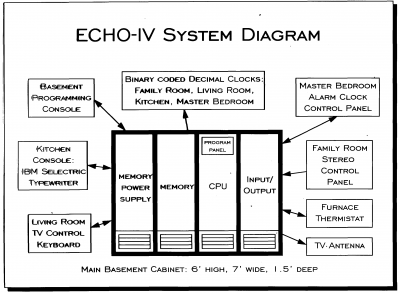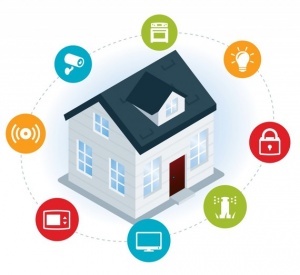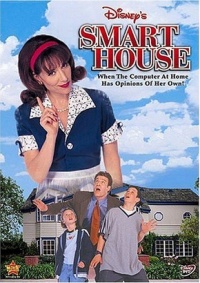Smart Home
Smart home' refers to a place of residence where amenities such as electricity, computers, security systems, and entertainment systems can interact with each other through an online application or device. Smart Homes are some of the latest technologies under the AI category. Smart Homes have been praised for its attention to convenience and efficiency and continues to add more features to existing technologies each year. However, smart homes have received much criticism as well in the areas of privacy and ethics.
Contents
History
Emerging Devices
Between 1900 to 1920, the introduction of household machines made housework easier and less time consuming to accomplish. These products benefited the middle class, which was dealing with a short supply of human cooks, maids, launderers, and others. From the first vacuum cleaner in 1901 to technology such as the electric toaster, dishwasher, and garbage disposal that followed suit, the need to spend time on manual work declined. [1] Products were being marketed as "spring cleaning with electricity" and "automatically gives you time to do those things you want to do." [2]
More home appliances continued to appear in the years following. The washing machine and dryer both appeared in the mid-1930s, while the automatic coffeepot was invented in 1952. [1]
Shift to Automation

The first attempt to make a machine "smart" was in 1966, with the invention of the home computer ECHO IV. It was created by Jim Sutherland, an engineer in Pittsburgh, for his family's personal use. The computer consisted of four large cabinets, which were around 800 pounds each, and a central processing unit (CPU). [3] Keypads were placed at various points in the house to complete tasks. These included creating shopping lists, controlling the home's temperature, and turning devices on/off. [4] While the computer was considered a novelty, its success is debated due to the machine's size.
In 1969, a similar appliance, the 100-pound Honeywell Kitchen Computer, was advertised in a Neiman Marcus Christmas catalog. It was marketed with the slogan "If she can only cook as well as Honeywell can compute" and sold with a price tag of $10,000. [5] In addition, a teletype, a paper tape reader, and coding skills were necessary to effectively run the machine. [5] The product was not bought by any customer, and it was thought the advertisement was a means to get people's attention.
It was not until 1975 when a home automation protocol was developed. Created by Pico Electronics in Glenrothes, Scotland, X10 relied on powerline communication, which allows data to be transmitted via power cables. It is still in use and is thought to be "the father of modern home automation." [6]
Today's technologies continue to expand. Homebuyers are constantly looking for the newest high technological innovations that can be incorporated into the home.[7]
Today's Technology
Smart home products became more popular in the 2000s due to affordability and easier access to products. 2010 started a wave of businesses that create gadgets for the home.
Nest Labs
Nest Labs is an American home automation company founded by two former Apple engineers, Tony Fadell and Matt Rogers in 2010. Starting from the Nest Learning Thermostat in 2011, the business now sells thermostats, cameras, doorbells, and alarm systems that have the ability to connect to Wi-Fi and are sensor-driven. [6]The startup was bought for $3.2 billion by Google in 2014. [8]
SmartThings
SmartThings was founded by Alex Hawkinson, Scot Vlaminck, Jesse O'Neill-Oine, Andrew Brooks, Jeff Hagins, and James Stolp in 2012 as an American startup focused on letting users synchronize their connected gadgets on one technology app and hardware hub. It was acquired by Samsung for $200 million in 2014. [9]The company sells products such as Philips Hue Lighting, Bose SoundTouch Wireless Music Systems, Google Home, and Amazon Echo, which can all connect to the SmartThings Hub. [10]
Hive
Hive is a British producer of technology for smart homes. It was created in 2012 by Centrica which also owns British Gas and Direct Energy (U.S.). It primarily serves the UK, Ireland, and North America. The company does not sell any other products except its own, and the Hive app connects the heating, lights, sensors, and plugs that it sells. [11] On 13 March 2018, Hive released a new product called the Hive Hub 360 in the UK, which has been designed by Swiss designer Yves Béhar. [12] The product has AI (Artificial Intelligence) to listen to its environment and send the recordings to the user's Hive app. [13] Hive Hub 360 has not been released in the U.S. yet.
Hubs
Smart home Hubs are devices centralize all controls of one's home into one device. They have been created by many different companies such as Samsung, Comcast, Google and Amazon starting in 2012.[14] Hub products started as devices that must remain in the home. In 2015, other devices began to emerge. The options now range from items such as pods that can stand alone or connect/stay on the wall of the home. They can be accessed from other technological devices in order to control remotely. These devices connect into wireless signals and home gadgets in order to control everything from one simple tool.[15]
Privacy Concerns
There have been several incidences in the past few years regarding smart homes, privacy, and ethics. Voice assistants like Amazon Alexa and Google Home are "always listening." Once these devices are awakened by the user, the encrypted recording is stored in a backend server. This is seen as a danger by digital security businesses. Candid Wueest, Symantec's chief researcher on threat, says that people could listen or watch smart device owners by hacking and turning on devices remotely.[16]
November 2015 Murder Case
In November 2015 in Bentonville, Arkansas, James Bates called two friends over, one being Victor Collins, a former police officer in Georgia, to watch football and drink alcohol. Afterwards, the men spent time in Bates' hot tub. In the morning, Bates found Collins dead in the hot tub. While Collins' blood-alcohol content was high (about four times more than the limit to drive in the state), the prosecution believed that Bates' Amazon Echo could provide a recording, as a person present that day could remember music being played on it. [17] While Amazon hesitated due to privacy at first, they eventually gave permission to release the records. In December 2017, the murder charge was ultimately removed. [18]
Security
Each device added to a smart home increases the potential for hackers to access a users system. While computers and phones have measures in place to keep intruders at bay, very few smart home devices have these security measures in place. This is exacerbated by the fact that many of the companies who produce these devices prioritize finishing and shipping them as soon as possible over creating secure, stable systems. This is because of the added time it would take to properly vet and test these smart devices. Since smart home devices can quickly become obsolete, getting them to the market takes precedence. [19] Additionally, many smart home devices do not require any sort of authentication. Most smart home devices generally use standard, out-of-the-box default passwords which can be found online with a Google search. From there, hackers can use malware and botnets to take over these smart home devices. [20]
Popular Culture
Smart House
Smart House is a movie that references smart homes. [21] Made in 1999 by Disney Channel, the movie follows Ben Cooper, a 13-year-old who just lost his mother, and his family. The Coopers win a computerized house, and Ben recodes the software to exhibit maternal-like behavior. Yet, the program takes the role too far and ends up locking the entire family in the house, believing that the external environment is unsafe.
References
- ↑ 1.0 1.1 National Academy of Sciences on behalf of the National Academy of Engineering. Household Appliances Timeline
- ↑ Aldrich, Frances K. "Smart Homes: Past, Present, and Future." [1] 2003. Retrieved 15 March 2018.
- ↑ 3.0 3.1 Spicer, Dag. "The ECHO IV Home Computer: 50 Years Later." [2] Computer History Museum. 31 May 2016. Retrieved 15 March 2018.
- ↑ Rothfeld, Lindsay. "Tech Time Machine: The Smart Home" [3] Mashable. 8 Jan 2015. Retrieved 15 March 2018.
- ↑ 5.0 5.1 Hernandez, Daniela. "Before the iPad, There Was the Honeywell Kitchen Computer" [4] Wired. 22 November 2012. Retrieved 15 March 2018.
- ↑ 6.0 6.1 Fritz, Ron. "Is X-10 an Obsolete Technology?" [5] Lifewire. 27 February 2017. Retrieved 15 March 2018.
- ↑ Markowitz, Riki. “How Smart Home Technology Is Changing Today's Homes.” Smart Home Technology Is Changing Todays Homes, Builder Homesite Inc, 5 Apr. 2017
- ↑ "Nest Labs." [6] Crunchbase. Retrieved 15 March 2018.
- ↑ Tilley, Aaron. "Samsung Acquires SmartThings, A Fast-Growing Home Automation Startup" [7] Forbes. 14 Aug 2014. Retrieved 15 March 2018.
- ↑ "Featured Products" [8] SmartThings.com. Retrieved 15 March 2018.
- ↑ [9] hivehome.com. Retrieved 15 March 2018.
- ↑ Parsons, Elly. "The all-hearing Hive Hub 360 Hits Shelves." [10] Wallpaper*. 14 March 2018. Retrieved 15 March 2018.
- ↑ Merriman, Chris. "Hive's Home Hub 360 Brings AI Listening to Smart Home Users" [11] The Inquirer. 13 March 2018. Retrieved 15 March 2018.
- ↑ Prospero, Mike. “Best Smart Home Hubs of 2018.” Tom's Guide, 12 Mar. 2018
- ↑ Priest, David. “The Only Way to Save the Smart Home Hub Is to Kill It.” CNET, 1 May 2017
- ↑ Weisbaum, Herb. "Hey Alexa, How Secure are voice-activated assistants Like You?" [12] NBC News. 28 Nov 2017. Retrieved 15 March 2018.
- ↑ McLaughlin, Eliott C. et al. "Alexa, Can You Help With This Murder Case?" [13] CNN. 28 Dec 2016. Retrieved 15 March 2018.
- ↑ Chavez, Nicole. "Arkansas Judge Drops Murder Charge in Amazon Echo Case" [14] CNN. 2 Dec 2017. Retrieved 15 March 2018.
- ↑ https://www.technologyreview.com/s/517931/more-connected-homes-more-problems/
- ↑ https://www.cnet.com/news/how-hackable-are-your-smart-home-gadgets/
- ↑ "Smart House" [15] Disney. Retrieved 15 March 2018.

